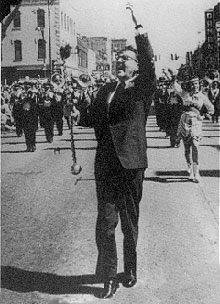MEREDITH WILLSON, THE MUSIC MAN OF MASON CITY
 Robert Meredith Willson (1902-1984) was born in Mason City, Iowa and had an immensely successful career in the music and entertainment industry as a musician, composer, conductor, arranger, author, and radio personality. While growing up in Mason City, Willson showed great musical promise. After his Mason City High School graduation he went to New York City to study and before long was professionally engaged playing with John Phillip Sousa and then with the New York Philharmonic Orchestra. After a stint in the Army, he began working in radio and television. In addition to composing, writing and appearing on television, Willson made concert appearances around the country with his wife Rini, herself a star in the concert, radio and opera business.
Robert Meredith Willson (1902-1984) was born in Mason City, Iowa and had an immensely successful career in the music and entertainment industry as a musician, composer, conductor, arranger, author, and radio personality. While growing up in Mason City, Willson showed great musical promise. After his Mason City High School graduation he went to New York City to study and before long was professionally engaged playing with John Phillip Sousa and then with the New York Philharmonic Orchestra. After a stint in the Army, he began working in radio and television. In addition to composing, writing and appearing on television, Willson made concert appearances around the country with his wife Rini, herself a star in the concert, radio and opera business.
Meredith Willson is best remembered for his Broadway musical “The Music Man”, for which he wrote the script, lyrics and music. This famous musical was a tribute to his hometown since the fictitious “River City”, featured in the Broadway hit, was based on places and people in Mason City. “The Music Man” became one of the five longest running musical plays in Broadway history and won several prestigious awards. The play has been revived both on Broadway and in the movies – a Walt Disney production of “The Music Man” stars Matthew Broderick and Kristin Chenowetch. The Beatles even capitalized on the success of the musical with their cover of “Till There Was You.”
Willson also wrote symphonies and many hit songs including “It’s Beginning to Look A Lot Like Christmas” and “May the Good Lord Bless and Keep You”. Other famous works by Willson include two other musicals, “The Unsinkable Molly Brown” and “Here’s Love”.
Meredith Willson is honored annually at the North Iowa Band Festival while The Music Man Square and Meredith Willson Boyhood Home in Mason City, stand tribute to his life and legacy. He will be remembered throughout the world for his famous melodies, but he will live on in Mason City, Iowa as “The Music Man of River City.”
Biographical Timeline:
- 1902 Robert Meredith Willson was born in Mason City, Iowa to John and Rosalie (Reiniger) Willson. Meredith was the largest baby ever born in Iowa at the time of his birth, weighting 14 lbs, 6 ounces. Meredith’s father was a Mason City businessman, managing a bakery in town. His mother was a musician and Sunday school teacher. Meredith had a sister, Lucille “Dixie” Willson, who was 12 years older and a brother, John Cedrick “Ced” Willson who was 2 years older. Dixie became a successful writer of short stories, plays, children’s books, novels, movie scripts, and even cookbooks. After playing bassoon in the John Philip Sousa Band, Ced became a civil engineer and a leading expert in the field of lightweight aggregate and concrete products.
- 1908 Meredith started studying piano with his mother.
- 1912 Meredith began playing the flute in the Mason City Municipal Band.
- 1917 Meredith Willson played with an orchestra at Lake Okoboji, Iowa, a resort town 100 miles west of Mason City, in his first paying job – $13 a week.
- 1918 Meredith’s sister, Dixie moved to New York City and Meredith went to visit her.
- 1919 Meredith graduated from Mason City High School. Later that same year, John Philip Sousa’s band performed in Mason City where a member of his band met and was impressed by the 18-year-old flute player, Meredith Willson.
- 1919 Meredith moved to New York City where he enrolled in the Damrosch Institute (now Julliard), studying under Georges Barre’re.
- 1921 He joined John Philip Sousa’s Band, playing with them for three years as first flute. Between seasons he played in the Rivole and Rialto Theater Orchestras.
- 1923 Willson conducted recording experiments with Lee deForest. These experiments led to the invention of bringing sound to movies, at that time known as “Talkies”.
- 1924 Meredith Willson left Sousa’s Band to play in the Philharmonic Symphony Society of New York. (Later known as the New York Philharmonic Orchestra).
- 1926 He played flute in a back-up orchestra on NBC radio and composed musical scores for two movies.
- 1929 Meredith left the New York Philharmonic to conduct the KJR radio orchestra in Seattle, WA and soon became musical director for KFRC radio in San Francisco.
- 1932 Meredith started a radio show called “Concert in Rhythm” that featured popular dance music.
- 1934 “The Big Ten”, forerunner of “The Lucky Strike Hit Parade,” was created by Meredith Willson.
- 1936 He moved to Hollywood to become musical director for the “Maxwell House Show Boat from Hollywood” show.
- 1938 Meredith became musical director of “Good News Radio Hour” until 1942. It became the number one radio show in the country at that time.
- 1940 Willson began composing soundtracks for movies starring film greats such as Charlie Chaplin and Bette Davis.
- 1941 “You and I”, recorded by Tommy Dorsey and Frank Sinatra was written by Meredith and the song became the #1 hit in the country for nine months. This same year he wrote “Two in Love” which also became a hit song, and was recorded by Glenn Miller.
- 1942 Willson joined the Army as part of the Armed Forces Radio Service.
- 1945 Meredith joined the George Burns and Gracie Allen show as musical director.
- 1946 “Sparkle Time” was created by Meredith Willson but its name was changed to “Meredith Willson’s Music Room” in 1948.
- 1950 He became musical director for “The Big Show.” This radio extravaganza featured all of the big names in the entertainment industry. Each show ended with the same song composed by Willson, “May the Good Lord Bless and Keep You.” The inspiration for this song came from Willson’s mother, as it was her parting words to her Sunday school class every week when he was a child. This song was Willson’s biggest hit and was recorded by stars such as Bing Crosby, Gene Autry, Frankie Laine, and Tammy Wynette.
- 1951 Meredith Willson began working on “The Silver Triangle,” renamed “The Music Man,” an autobiographical film set in his hometown, Mason City, Iowa. This famous production won 8 Tony Awards, including Best Musical and Best Actor.
- 1957 “The Music Man” opened at the Shubert Theater in Philadelphia on November 17th and at the Majestic Theater in New York City on December 19th.
- 1958 While “The Music Man” was still going strong on Broadway, Meredith signed on to write the music for “The Unsinkable Molly Brown.”
- 1960 The musical ,”The Unsinkable Molly Brown”, opened on Broadway on November 3rd.
- 1961 Warner Brothers gained the movie rights to “The Music Man” and began film production.
- 1962 On June 19, 1962 at the Palace Theater in Mason City, Iowa, the movie “The Music Man” premiered. Meredith Willson and the cast of the movie traveled to his hometown for the event, which was held in conjunction with the North Iowa Band Festival. “The Music Man” won the Academy Award for Best Musical Score, and was nominated for Best Picture that same year.
- 1964 Metro Goldwyn Mayer produced the movie version of “The Unsinkable Molly Brown.” Meredith Willson’s last Broadway musical was “Here’s Love”, an adaptation of the popular Christmas movie, “Miracle of 34th Street.” The most famous song from “Here’s Love,” “It’s Beginning to Look A Lot Like Christmas,” has become a holiday standard.
- From 1964 until his death in 1984, Meredith Willson continued to write and play the music he so loved. But Meredith is also remembered for his great contributions to humanity. He was a member of the Big Brothers, an organization that provided support to fatherless boys, and was a six-time president of the Greater Los Angeles chapter of Big Brothers. President Kennedy presented Willson with the National Big Brother Award in recognition of his service to the country’s youth. President Lyndon Johnson appointed Willson to the National Council of the Humanities.
- In 1982, the National Academy of Popular Music elected him to the Songwriters Hall of Fame. He received five honorary doctorates. Willson was posthumously awarded the Iowa Award for lifetime achievement by Iowa Governor Terry Brandstad and the Presidential Medal of Freedom by President Ronald Regan.
